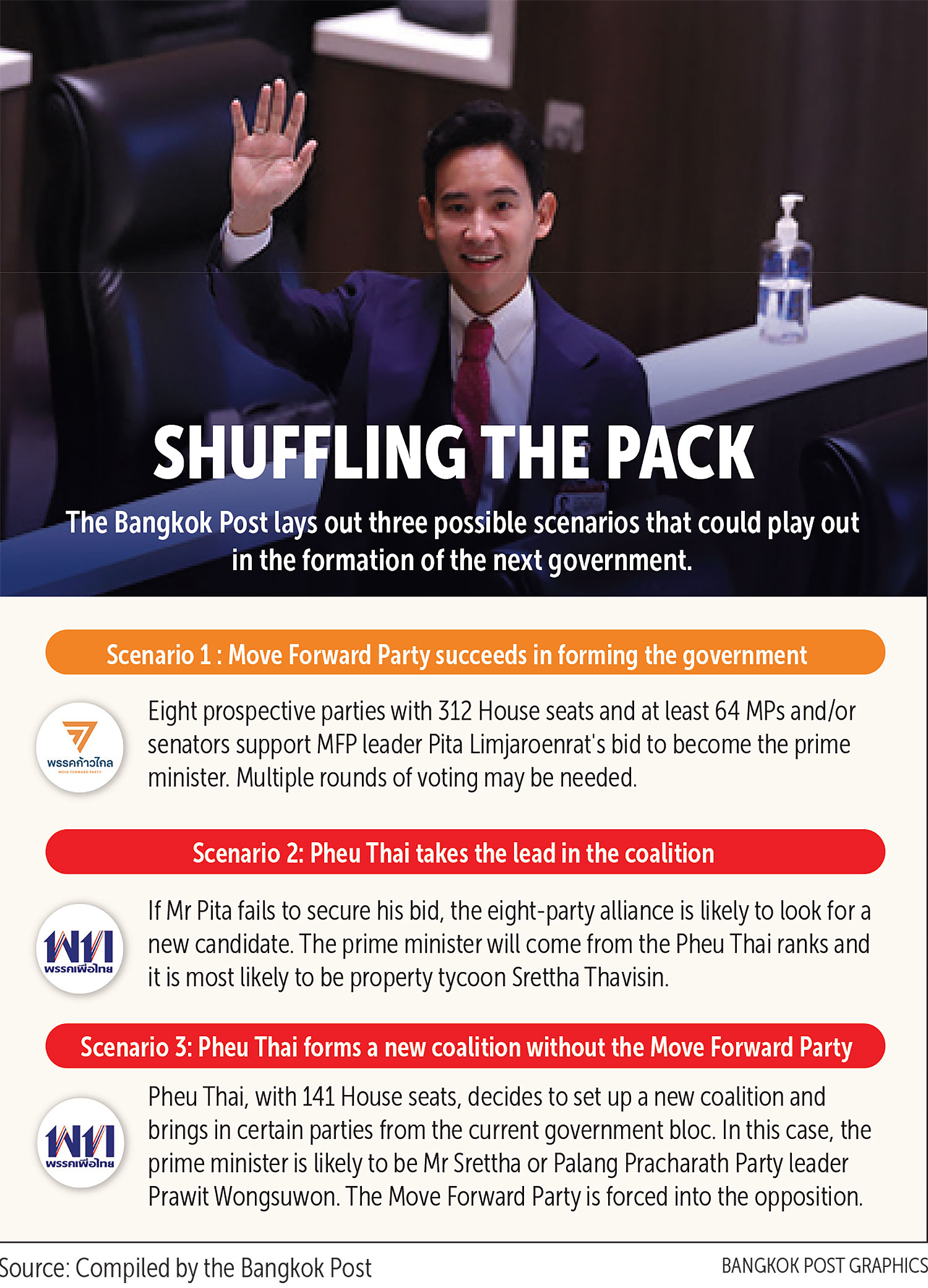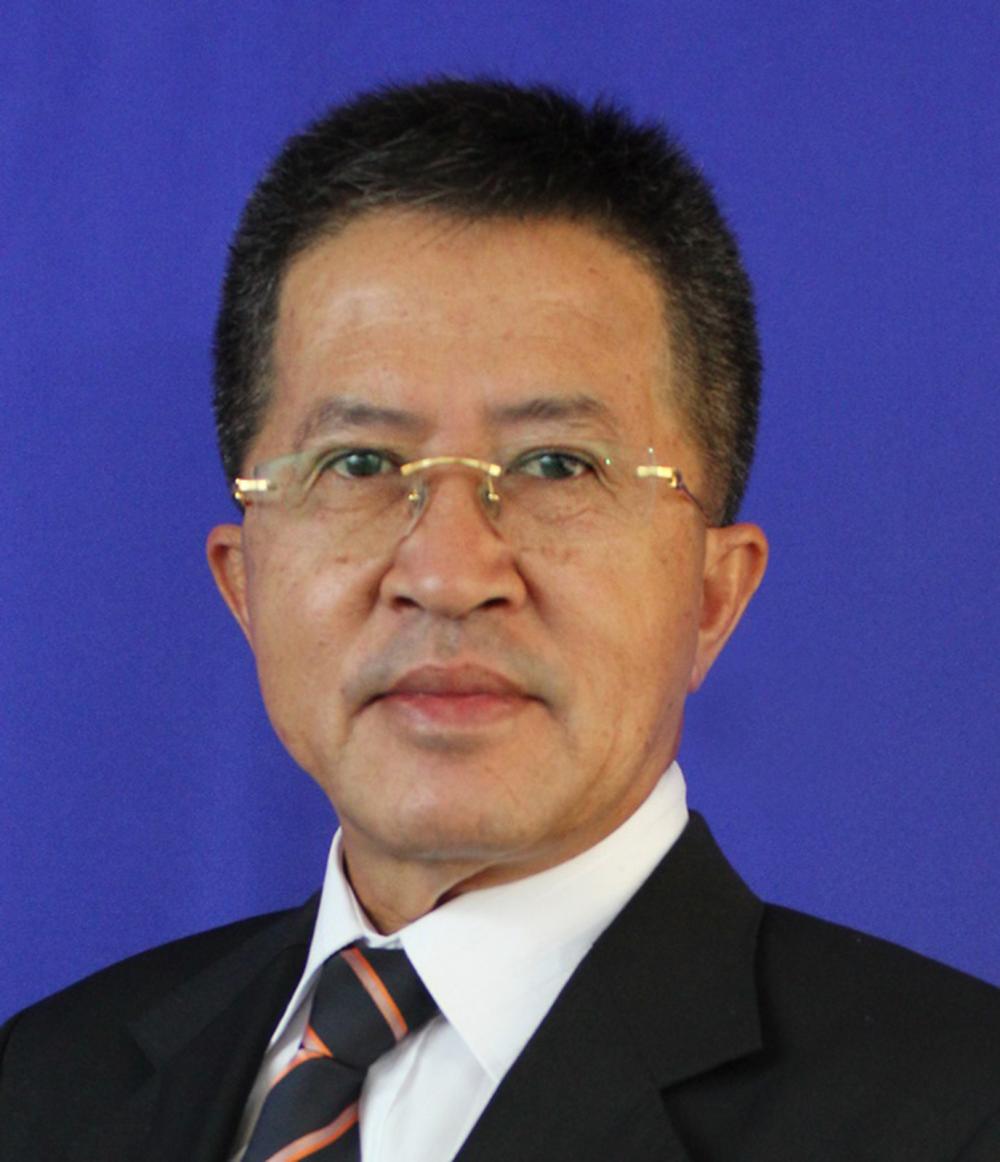
The parliamentary vote to select the new prime minister is less than a week away and it is anybody's guess who will emerge as the country's next leader.
Under the charter, a candidate must receive at least 376 votes from among 500 MPs and 250 senators to become prime minister.
As things currently stand, the eight-party coalition led by the Move Forward Party (MFP) controls 312 House seats, so it needs the support of at least 64 votes from either senators or MPs outside the bloc to secure MFP leader Pita Limjaroenrat's bid to become prime minister.
When the joint sitting of MPs and senators convenes this Thursday for the crucial vote, political observers don't think the new prime minister will emerge in one round of voting. The coalition formation is likely to shift if Mr Pita cannot muster enough support to meet the 376-vote threshold after the second round.
In that event, observers present two possible scenarios: Pheu Thai, the second largest party in the eight-party bloc, may nominate Srettha Thavisin and a joint sitting of parliament may vote for Mr Srettha to be the next prime minister.
Or, Pheu Thai will take the lead in the coalition and bring in new partners or form a new one without the MFP.
In the latter scenario, either Mr Srettha or Gen Prawit Wongsuwon, leader of the Palang Pracharath Party (PPRP), may be voted in as prime minister, while the MFP may be forced into opposition.

Alliance to move forward
The selection of the House speaker and two deputies is a strong sign the formation of the eight-party coalition is on track, said MFP deputy party leader and list-MP Natthawut Buaprathum.
He said the bloc is also counting on MPs from outside the bloc and senators who indicate they will respect the majority's wishes and so vote for Mr Pita to be prime minister.
Mr Natthawut said the number of senators expected to vote for Mr Pita is believed to exceed the number the MFP-led alliance needs and he expects the prime minister will be known in just one round of voting.
He said the party will prep Mr Pita for questions to be raised when he presents his vision speech before the joint sitting and if the party can address concerns, some may have a change of heart.
Many senators are against the MFP's policies to amend the lese majeste law and may vote against Mr Pita or cast a vote of abstention.
"We believe several senators have decided to vote for him but keep the decision to themselves. The number of those in favour of Mr Pita is growing," he said.
According to the MFP deputy party leader, at this point there is no situation in which the MFP would have to join the opposition and it will take a while before any legal cases against Mr Pita are finalised.
The MFP leader faces complaints questioning his eligibility over a shareholding in iTV Plc. The constitution bars individuals with media shareholdings from running for office.
Mr Natthawut also ruled out the possibility of some party MPs switching sides and dismissed speculation the party could be at a disadvantage because the House speaker is now in the hands of the Prachachat Party, known to be close to Pheu Thai.
He said the party's fight for the House speaker post has nothing to do with the prime minister vote and the issue is settled now that Wan Muhamad Noor Matha, of the Prachachat Party, has assumed the role.
Regardless of who the House speaker is, the coalition is obliged to follow the memorandum of understanding on coalition formation which it signed, he said.
He said it is time for the country to have a government which can handle pressing matters including investors' confidence and the budget bill for the 2024 fiscal year.
Asked if the MFP is ready to vote for a prime minister candidate from Pheu Thai, he said he believed every party has selected the best it can offer but it is too soon to consider them.
"We must support the MFP's candidate first. But if we really have to pick someone else, we will consider candidates from within the alliance," he said.

Two rounds 'should be enough'
There is no limit as to how many times a prime minister vote can be held.
Mr Wan indicated that if a candidate fails to win a first round of voting, further rounds will be held until a candidate reaches the 376-vote threshold. A second round of voting is tentatively scheduled on July 19.
However, there are fears among the Pheu Thai Party that the deadlock can trigger the opposing bloc to nominate a challenger to Mr Pita in a bid to form a minority government.
According to a source in Pheu Thai, although the constitution does not put a limit on how many times parliament will meet to select the prime minister, there is no point in still nominating Mr Pita after two rounds.
There would be no problem if the Senate was not involved in the selection process, and without its support the eight-party alliance still needs MPs from outside the bloc, with Bhumjaithai currently on its radar, said the source.
But Bhumjaithai, which has 71 House seats, is against amending the lese majeste law and the party MPs abstained when the House voted to select the first deputy speaker candidate from the MFP.
The Chartthaipattana and Democrat parties may also be brought on board, but the alliance will have to wait and see how the Democrat leadership race turns out, according to the source.
"But above all, it should be agreed how many rounds of voting should be enough. If it drags on, the other bloc may nominate a challenger. And if they do, they may succeed," said the source.
It is unlikely that Bhumjaithai will give Mr Pita votes without getting anything in return. In fact, party is expected to drive hard bargain, said the source.
If Mr Pita's bid fails and Pheu Thai steps in to lead the coalition, the party will nominate Mr Srettha in parliament, the source said, ruling out the possibility of "an outsider" prime minister.
In case parliament fails to select a new premier from the candidate lists supplied by the parties, Section 272 allows half of the 750 MPs and senators to initiate a motion to suspend the rule requiring that PM candidates come from party lists.
Such a motion requires the support of two-thirds of all the lawmakers, or 500, to suspend the rule. A nominated outsider would also need at least 376 votes to become prime minister.
The source admitted that although the House speaker selection was quick and smooth, the prime minister vote could face hiccups. "There are concerns about renegade MPs," the source said.
PM will emerge 'from Pheu Thai'
Witthaya Kaewparadai, deputy leader of the United Thai Nation Part (UTN), said the MFP has put itself in a difficult position and if it cannot get itself out, Pheu Thai will take the lead in coalition formation.
He was referring to the MFP's stance that it would not do business with those who supported Prime Minister Prayut Chan-o-cha in the 2019 general election.
The MFP and its partners will have to work things out with parties they brand "dictatorship" parties, he said, adding they know what the rules are, but still choose to put themselves on the spot.
However, Pheu Thai is considered to be in a better position than the MFP to clinch the PM post because it is opposed to revising the lese majeste law, said the UTN deputy leader.
"Whether or not there will be more parties added to the coalition depends on whether they reverse their stance [on not working with pro-military parties]," he said.
Asked about the UTN's stance, he said the party made its stance clear when it put up MP for Phitsanulok, Padipat Suntiphada, for the first deputy House speaker post, challenging the MFP.

Sen Somchai Sawaengkarn said the MFP's election victory caught the Pheu Thai Party off guard and posed a threat to the party which was banking on the two-ballot system to deliver it a landslide win.
In his view, Pheu Thai will negotiate to be part of the next coalition government and if an alternative is possible, the party may drop the MFP and join hands with Bhumjaithai or the PPRP.
"Pheu Thai's goal is to be in the government and it's willing to drop the prime minister post. It may even give the post to the PPRP but it's not easy due to pressure from MFP supporters," he said.
According to the senator, Pheu Thai will not nominate Paetongtarn "Ung Ing" Shinawatra, daughter of deposed prime minister Thaksin, this time to hold off critics.
Mr Somchai rejected speculation about the current government bloc forming a minority government because it would be short-lived and it would backfire when the next elections are held.
"A minority government is unnecessary and it's not the way things should be. The parties that opt for this won't survive the next polls," Mr Somchai added.








